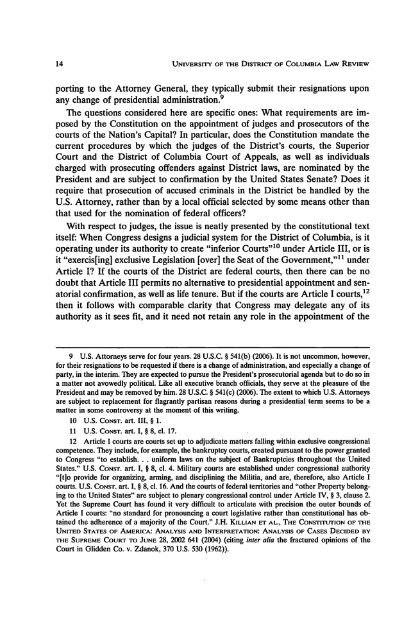Download Electronic Version - UDC Law Review
Download Electronic Version - UDC Law Review
Download Electronic Version - UDC Law Review
You also want an ePaper? Increase the reach of your titles
YUMPU automatically turns print PDFs into web optimized ePapers that Google loves.
14 UNIVERSITY OF THE DISTRIcr OF CoLUMBIA LAW REVIEW<br />
porting to the Attorney General, they typically submit their resignations upon<br />
any change of presidential administration. 9<br />
The questions considered here are specific ones: What requirements are imposed<br />
by the Constitution on the appointment of judges and prosecutors of the<br />
courts of the Nation's Capital? In particular, does the Constitution mandate the<br />
current procedures by which the judges of the District's courts, the Superior<br />
Court and the District of Columbia Court of Appeals, as well as individuals<br />
charged with prosecuting offenders against District laws, are nominated by the<br />
President and are subject to confrrmation by the United States Senate? Does it<br />
require that prosecution of accused criminals in the District be handled by the<br />
U.S. Attorney, rather than by a local official selected by some means other than<br />
that used for the nomination of federal officers?<br />
With respect to judges, the issue is neatly presented by the constitutional text<br />
itself: When Congress designs a judicial system for the District of Columbia, is it<br />
operating under its authority to create "inferior Courts,,10 under Article III, or is<br />
it "exercis[ing] exclusive Legislation [over] the Seat of the Government,',ll under<br />
Article I? If the courts of the District are federal courts, then there can be no<br />
doubt that Article III permits no alternative to presidential appointment and senatorial<br />
confirmation, as well as life tenure. But if the courts are Article I courts, 12<br />
then it follows with comparable clarity that Congress may delegate any of its<br />
authority as it sees fit, and it need not retain any role in the appointment of the<br />
9 U.S. Attorneys serve for four years. 28 U.S.C. § 541(b) (2006). It is not uncommon, however,<br />
for their resignations to be requested if there is a change of administration, and especially a change of<br />
party, in the interim. They are expected to pursue the President's prosecutorial agenda but to do so in<br />
a matter not avowedly political. Like all executive branch officials, they serve at the pleasure of the<br />
President and may be removed by him. 28 U.S.C. § 541(c) (2006). The extent to which U.S. Attorneys<br />
are subject to replacement for flagrantly partisan reasons during a presidential term seems to be a<br />
matter in some controversy at the moment of this writing.<br />
10 U.S. CONST. art. III, § 1.<br />
11 U.S. CONST. art. I, § 8, cl. 17.<br />
12 Article I courts are courts set up to adjudicate matters falling within exclusive congressional<br />
competence. They include, for example, the bankruptcy courts, created pursuant to the power granted<br />
to Congress "to establish ... uniform laws on the subject of Bankruptcies throughout the United<br />
States." U.S. CONST. art. I, § 8, cl. 4. Military courts are established under congressional authority<br />
"[t]o provide for organizing, arming, and disciplining the Militia, and are, therefore, also Article I<br />
courts. U.S. CONST. art. I, § 8, cl. 16. And the courts of federal territories and "other Property belonging<br />
to the United States" are subject to plenary congressional control under Article IV, § 3, clause 2.<br />
Yet the Supreme Court has found it very difficult to articulate with precision the outer bounds of<br />
Article I courts: "no standard for pronouncing a court legislative rather than constitutional has obtained<br />
the adherence of a majority of the Court." J.H. KILLIAN ET AL., THE CONSTITUTION OF THE<br />
UNITED STATES OF AMERICA: ANALYSIS AND INTERPRETATION: ANALYSIS OF CASES DECIDED BY<br />
THE SUPREME COURT TO JUNE 28, 2002 641 (2004) (citing inter alia the fractured opinions of the<br />
Court in Glidden Co. v. Zdanok, 370 U.S. 530 (1962».














